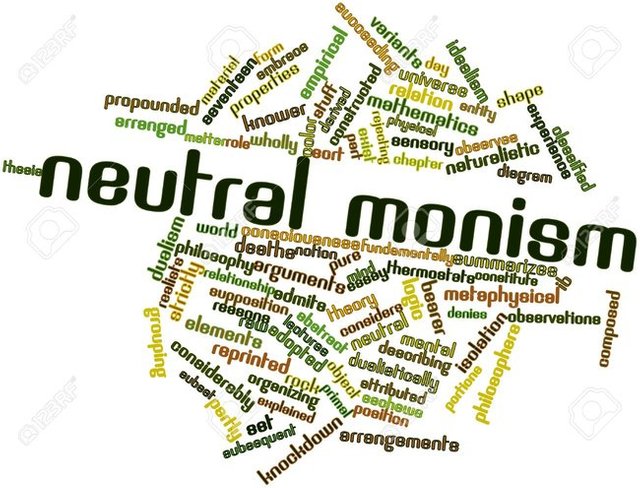Background, Theories and Principles of Monism

Image Source
Three Versions of Monism
Theories in which just matter ultimately exists.
Theories in which just mind ultimately exists.
Theories in which some third kind of substance, neither mind nor matter exists.
The subdiscipline of philosophy of mind which is regularly called physicalism, with regards to panpsychism the two terms are typically regarded as synonymous. Materialism is the standard, default view of the scientific community. In its mechanistic form it sees the universe as made out of dormant, inactive matter that arranges itself into the perplexing objects of our world and by one means or another offers ascend to mind and consciousness. Mind, to the degree that it is taken as real, is viewed as an element of fundamental matter and energy.
Three Classes of Materialist Theories
Identity Theory
Functionalism
Eliminativism
Identity Theory
Followers of the identity theory assert that mental states are real yet that these states are identical with brain states. Someone's mind, encountering a red sensory impression, is in the "red mental state" since his brain, physically, is in the "red physical brain state." There is consequently an onetoone correspondence between the physical states of a brain and the mental states experienced, they are one and the same, just appearing to us as changed. Mental states are nothing in themselves and don't have a one of a kind ontological standing.
Spinoza might be said to have started this approach, yet it was not completely verbalized until the middle of the twentieth century. J. J. C. Savvy is maybe the best-known identity theorist, different promoters incorporate Herbert Feigl, David Lewis, and D. M. Armstrong. At issue for the identity theory is the fundamental nature of the identity. On the off chance that it is guaranteed that mind is identical with brain, at that point this suggests mind exists together with certain physical processes, in particular those happening in the neural network that makes up the human brain.
Typically unaddressed are the issues of animal mind, plant mind, or mind in general. A legitimate identity theory ought to depict what correct physical processes are identical with mind and why. Spinoza viewed all things as being identical with mind, and he was in this way both an identity theorist and a panpsychist. Feigl in like manner floated near panpsychism. Bernhard Rensch recognized his position as panpsychist identism. All the more commonly, identity theorists appear to not address the bigger issue.

Image Source
Functionalism
Functionalism contends that mental states are real and that they are identical with a specific process state, or state of information. The process state is resolved totally by the causal pretended by the system. Anything that instantiates the suitable information state will receive the comparing mental state. At the end of the day, the mental property can be thought of as a second-order impact, the functional part of the physical system being essential.
In this way, functionalism can be viewed as a kind of generalization of the identity theory, not only a brain, not only a nervous system, but rather any physical system is fit for offering ascend to a mental state. Late advances in computer science and artificial intelligence have bolstered the case for functionalism, especially with such prominent cases as the thrashing of the chess champion Garry Kasparov by the computer program Deep Blue.
Certain identity theorists, including D. M. Armstrong and Hilary Putnam, are sometimes viewed as functionalists, and William Lycan and Daniel Dennett have advanced functionalist theories. Once more, functionalism can be believed to shade into panpsychism, regardless of the possibility that it is allowed that exclusive certain complex functional states can instantiate, say, human consciousness, it is not necessarily the case that less unpredictable systems can't instantiate lower orders of mind.
Eliminativism
Eliminativism is the view that mind is some way or another imaginary or unreal, is a genuinely radical materialism and a logical expansion of behaviorism. Eliminativist philosophers point to propels in science that appear to clarify everything about the world in physical terms, maintaining a strategic distance from any requirement for reference to sentience, consciousness, and experience.
They consider this to be a further advance in sifting through superfluous and confounding ideas about reality, a process that started with the end of the pantheon of Greek and Roman gods, proceeded through the end of the Christian God in the time of Laplace and Nietzsche, proceeds with still. W. V. O. Quine and Paul and Patricia Churchland are typically, however not uncontroversially, related with this view.

Image Source
There are sure philosophical weaknesses related with the principle of materialist monism. Consider two of these. First, it can be contended that the present system of physical monism, or physicalism, isn't exceptionally monistic. Despite the fact that physicists view matter as one sort of thing, they have been not able make a brought together theory of matter.
On the standard view, mass/energy comprises of mass particles, which arrive in a sum of 12 varieties, and of four particular force particles. Moreover, subatomic particles carry on in exceptionally impossible to miss and non-mechanistic ways, which vary radically from the behavior of items in the regular world. Such a system can scarcely be called monist.
A second shortcoming is the issue of accounting for the nearness of the human mind. All theories other than eliminativism must clarify why humans alone have mind and how mind came to rise through the span of evolution. Apparently, materialists hold that there is something ontologically one of a kind about the brain of Homosapiens, or the brains of other adequately evolved organisms, that allows the good judgment and consciousness.
Mind is the ultimate reality
This is the position known as metaphysical idealism. Matter, to the degree that it is viewed as real, is viewed as a component or a part of mind. Following this definition, we can watch that Parmenides was maybe the first idealist, he recognized Being as the ultimate reality, and he compared it with mind. Anaxagoras likewise held a position near idealism.
Despite the fact that there were a limitlessness of substances, they were all brought into being and enunciated by the power of mind, whatever things were to be, and whatever things were, the same number of as are currently, and whatever things shall be, all these mind organized in order. Plato's system, in which the Forms or Ideas are the ultimate reality, can likewise be viewed as a variation of idealism.

Image Source
Four Forms of Idealism
Metaphysical or ontological idealism
Transcendental idealism
Absolute idealism
Personal or pluralistic idealism
Metaphysical idealism is a claim about the true nature of things. Religious administrator Berkeley, a famous metaphysical idealist, held the view that esse est percipi. For Berkeley, just minds and ideas exist, physical articles are really only accumulations of sensory impressions.
Transcendental idealism was formulated by Immanuel Kant as he tried to rise above empiricism. Kant's is to a greater degree a rationalist and epistemological claim, that all knowledge of reality is mental or phenomenal. Besides, Kant trusted that the mind plays an active part in forming the objects of knowledge, consequently infusing something of the character of our mind into everything we see.
Absolute idealism contends for the presence of a universal or absolute mind, something like a world-soul, that realizes itself in all things, including ourselves. Such a worldview was created by Fichte, Schelling, Bradley, and Royce, among others.
Finally, the alleged personal idealism of Howison and McTaggart rejected the idea of a single all-encompassing Mind yet held the thought that all things were realizations of mind. In their view, every thing is the self-realization of its own, singular mind.
There is maybe less qualification between these forms than may show up. Absolute and personal idealism are as much ontological theories as Berkeley's view. Berkeley's God sees all, similarly as the Absolute Mind does, however the absolute is realized in all things in a way that God, maybe, isn't. What's more, the individual minds of personal idealism would appear to be connected by some common, bringing together spiritual realm, which may go up against characteristics of an absolute. Of the four, just personal idealism infers a form of panpsychism. Then again, it ought to be certain that there are numerous varieties of panpsychism that don't assume any of the above systems of idealism.

Image Source
Neutral monism
Neutral monism places a neutral third entity, neither mind nor matter, as the ultimate reality. Mind and matter are then two parts of this more fundamental substance. The formal idea of neutral monism is generally viewed as having started in the late 1800s with Ernst Mach, who held that sensations were the premise of all reality, a view that is additionally a form of panpsychism.
To the degree that neutral monism imagines a common ground to both mind and matter, it unequivocally inclines toward panpsychism. To keep away from panpsychism, the neutral ground of reality would need to recognize animated forms of matter and inanimate ones. This would require a complex metaphysical system, something hard to accomplish in absolutely naturalistic terms.

Image Source

Meditating is very healthy for you. Yes science proves it!
Downvoting a post can decrease pending rewards and make it less visible. Common reasons:
Submit
나는 당신의 글을 게시하는 것을 좋아합니다. 포스트는 좋습니다. 나는 많은 팬들이되고 싶어. 좋은 아티스트가 되려면 이념을 성취하는데 당신의 지원이 필요합니다. 너 한테 도움이 필요해.
Downvoting a post can decrease pending rewards and make it less visible. Common reasons:
Submit
다행히 내 콘텐츠가 마음에 들어요. 내가 너를 어떻게 도울 수 있니?
Downvoting a post can decrease pending rewards and make it less visible. Common reasons:
Submit
네 언니 사랑의 보상. 나를 위해 조금.hehhhehehehe
Downvoting a post can decrease pending rewards and make it less visible. Common reasons:
Submit
오 :)
Downvoting a post can decrease pending rewards and make it less visible. Common reasons:
Submit
So many theories... what if they're all right?
Which one would you go with?
After all what is real, for the mind and eyesight alone cant percieve eberything.
What is color to a blind man? and what is sound to a deaf person? You can I can hear and see and that is real to us but what about those?
Are we even real?
Downvoting a post can decrease pending rewards and make it less visible. Common reasons:
Submit
The search for reality is the same with the search of truth. A search that is not going anywhere. A truth and reality to someone is an opposite to others.
Downvoting a post can decrease pending rewards and make it less visible. Common reasons:
Submit
Awesome post! So informative.
Downvoting a post can decrease pending rewards and make it less visible. Common reasons:
Submit